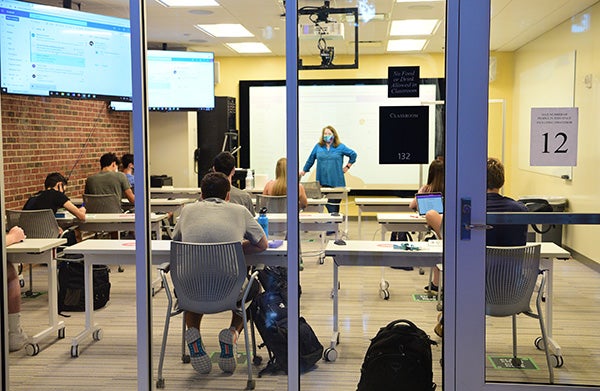
Under the specter of a global pandemic, the 2020–21 academic year has been one unlike any other in the history of the Freeman School, and the process of preparing for it began almost immediately after Tulane University made the decision last spring to shut down in-person classes for the semester and shift to online learning.
Early on, the university developed a plan for a so-called hybrid model of instruction that would combine a limited number of in-person students in a classroom with students attending the class remotely. With the likely prospect of delivering classes in this format through the spring 2021 semester if not longer, Dean Ira Solomon gathered his leadership team together in March to discuss how to ensure that students would receive the high-quality, highly engaging educational experience they expect in this new and uncertain environment.
“We realized early on we needed to be proactive in our response,” Solomon says. “It wasn’t enough to simply ask faculty to teach their classes using Zoom. We needed to give them the tools and support they needed to essentially reinvent their courses for this new learning environment.”
The first challenge was technological.
Tom Gerace, the Freeman School’s assistant dean for information technology and media services, and his team had previously developed a proposal to enhance technology in a small number of classrooms to facilitate online learning. Based on that proposal, Dean Solomon made the decision to upgrade almost every Freeman School classroom — 26 in all — with cameras, additional video monitors and microphones to better enable synchronous instruction for both in-person and remote students. The installation kicked off on June 22 and was completed by Aug. 14.
“There was a tremendous sense of urgency,” says Gerace. “In that timeframe, we would normally upgrade maybe four classrooms. It was just incredible for us to do 26 classrooms in eight weeks.”
The ceiling-mounted cameras enabled instructors to display themselves teaching, giving them the ability to take full advantage of the classroom’s whiteboards and AV technology. The additional monitors allowed instructors to display varied content such as PowerPoint slides on one monitor and a gallery view of students attending the class virtually on another, helping them to interact with both in-person and remote students while teaching.
In addition, the cameras use the NDI protocol, an IT standard that enables the school to link the uptown and downtown campuses into a single video network. Information technology staff can now monitor and operate the equipment through the campus network, including recording and storing video of class sessions over the network, a capability previously unavailable.
“The need to respond to the COVID crisis turned into an opportunity for the business school to equip nearly every classroom for online and/or hybrid teaching and tie our two campuses together,” Gerace says. “That gives us a lot of latitude to do many different things we want to do now and into the future.”
Technology, however, was just one part of the challenge. The other piece was ensuring that these new online classes were every bit as rigorous, interactive and engaging as traditional Freeman classes. After finishing the spring 2020 semester with online classes, Dean Solomon and the Freeman School’s leadership team recognized that creating a truly outstanding online learning experience would require more than simply broadcasting it via Zoom.
To help professors adapt their courses to online delivery, the Freeman School worked with Tulane’s School of Professional Advancement to bring in instructional designers specializing in online education, who worked with faculty one-on-one to tailor their classes to this new learning environment.
“In the online format, you have to be very intentional and purposeful and clear about the order and presentation of content,” says Christine Smith, professor of practice in accounting, who worked with an instructional designer on her Accounting 2010 course.
“One of the main things she helped me to do was organize the online content and make it more accessible and not so overwhelming.” Tim West, professor of practice in accounting, worked with instructional designers to help develop content for six courses he’s teaching this semester.
“The whole point of it is to try to make courses as accessible to students as possible, to give them as many differing ways to access the material as possible,” says West. “We’re trying to create a very nimble class in terms of how it’s delivered and how it’s consumed. That’s the big change in the classroom environment. It’s more of a focus on how students would like to consume material as opposed to just how faculty want to deliver it.”
In all, more than 20 Freeman faculty worked with instructional designers to help develop their online courses in areas including Canvas design, Zoom integration, student- friendly navigation and media support.
“Whether you like or dislike online education, it’s great for some people and, done well, it can be better in some ways than in class education,” says West. “But you have to recognize that it’s a different delivery systems. It’s like teaching two different courses.”
According to Associate Dean Clifton Brown, Freeman plans to continue working with SOPA to provide faculty members with instructional design assistance through the spring 2021 semester.

